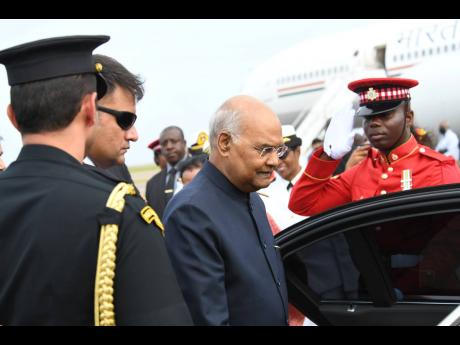Elizabeth Morgan | Strengthening CARICOM/India relations
The President of India, HE the Hon Ram Nath Kovind, is visiting the Caribbean Community (CARICOM) region from May 15-21. Specifically, he is on a state visit to Jamaica, May 15-18 and St Vincent and the Grenadines, May 18-21.
India and the CARICOM countries have had formal diplomatic relations for many years. Diplomatic relations with Jamaica covers the country’s 60 years of Independence. It is most likely that St Vincent and the Grenadine’s diplomatic relations with India dates to its independence in 1979. India, like Anglo-Caribbean countries, was a colony of Britain and gained its independence in 1948, 75 years ago. India, a republic, is also a member of the Commonwealth.
The cultural links between the Caribbean and India date back to the 19th century, in the post-Emancipation period, when to address the shortage of workers in the sugar industry, contracted indentured workers were brought from India between 1845 to the end of the indenture system in 1917. Over those 72 years, thousands of Indian workers were brought to mainly Guyana, Trinidad and Tobago, Jamaica, St Vincent and the Grenadines, Saint Lucia, Grenada, St Kitts/Nevis, and Belize. Indian indentured workers also went to the Dutch (including Suriname) and French territories.
Today, CARICOM countries have an estimated 1.3 million people of Indian descent. Indian arrival day is commemorated in CARICOM countries during May and June. Indian religious/cultural holidays are marked primarily in Guyana, Trinidad and Tobago and Suriname where people of Indian descent make up a large percentage of the population – in Guyana 44 per cent, Trinidad and Tobago 38 per cent, and Suriname 27.4 per cent. Only about 10 per cent of Jamaica’s population is of Indian descent, but the cultural influence is evident. Through British heritage, we also have the sport of cricket in common.
India does not only have diplomatic relations with the individual CARICOM countries but with the Community through the accreditation of its High Commissioner in Georgetown, Guyana. The aim is to strengthen relations with the region as a whole. India has in-country diplomatic presence in Guyana, Trinidad and Tobago, Suriname and Jamaica. These countries also now have diplomatic representation in New Delhi. Thus, there is a CARICOM Caucus there.
Since 2003, an India/CARICOM Joint Commission on Consultation, Cooperation and Coordination has existed. Foreign ministers of India and CARICOM have been meeting fairly often, usually on the margins of the UN General Assembly in New York. In 2019, the first India/CARICOM Summit was held when CARICOM Heads met with Prime Minister Narendra Modi in New York.
India is an important country with which to have political and economic engagement given its global influence being a member of the Group of 20 of the world’s major economies and the BRICS, the group promoting political and economic cooperation among Brazil, Russia, India and South Africa. CARICOM countries have opportunities to engage with India on a range of global issues not only in the UN system and the Commonwealth, but also at the World Trade Organization and other global economic fora.
CARICOM and India have technical and economic cooperation for development at both the national and regional levels which was seen during the COVID-19 pandemic.
In this period of pandemic and now with the global impact of the war in Ukraine, India is seen as having strong economic growth projections. We have to bear in mind that it has a market of 1.4 billion people.
CARICOM/INDIA TRADE
On trade in goods and services, I refer to my article of September 2020, on ‘CARICOM trade with Asian countries – all about imports’. Looking at merchandise trade with India specifically, Guyana, Trinidad and Tobago and Suriname recorded a surplus in their trade with India. Guyana’s exports to India increased to US$148.7 million from US$6.5 million in 2019. India’s exports to Guyana increased from US$25 million in 2019 to US$64.4 million in 2021. Trinidad and Tobago’s exports rose from US$79 million in 2019 to US$180 million in 2021. Imports from India rose from US$86 million in 2019 to US$92.3 million in 2021. Suriname exported US$37.3 million in 2021 and imported US$18.6 million. St Vincent and the Grenadines recorded a trade surplus with India in 2021 due to what seems to be a one-off export of US$12 million in goods, while importing US$956, 000.
Jamaica, Belize, and Barbados, other major CARICOM traders, have a trade deficit with India. In 2021, Jamaica’s exports declined from US$4million in 2019 to US$2.2 million in 2021, while imports increased from US$56 million in 2019 to US$78 million in 2021. Belize’s exports declined from US$845,000 in 2019 to US$419, 000 in 2021, and imports also declined from US$16.3 million in 2019 to US$13.2 million in 2021. Barbados’ exports also declined from 2019’s US$1.6 million to 2021’s US$811, 000, and imports were US$13.3 million in 2019 increasing to US$14.2 million for 2021. These countries also showed the COVID slump of 2020.
CARICOM’s main exports to India continue to be natural resource based concentrated in the energy sector. Trinidad and Tobago has had a trade agreement with India since about 1997. India has interest in Guyana’s developing energy sector. Imports from India continue to be mainly in medicaments, steel, textile and clothing, and other manufactured goods. Services exports are hard to assess, but would most likely be in India’s favour.
Much work is still needed to further promote and diversify CARICOM’s trade in goods and services, and investments with India, especially in a country such as Jamaica. Of course, this requires the engagement of the private sectors of both CARICOM and India for this to be fruitful.
Elizabeth Morgan is a specialist in international trade policy and international politics. Email feedback to columns@gleanerjm.com

